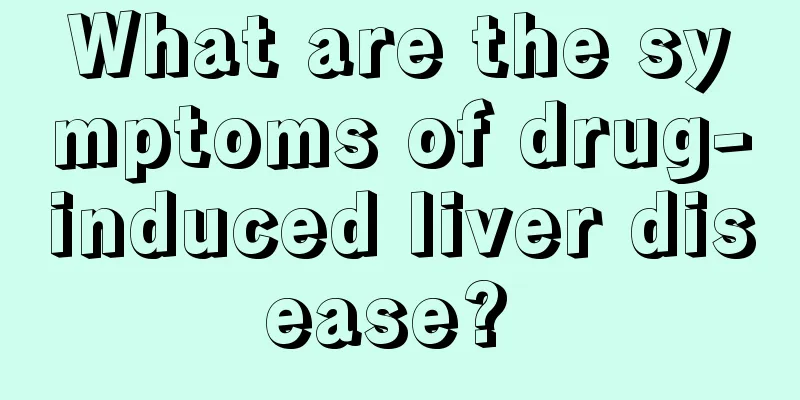What are the symptoms of drug-induced liver disease?

|
Drug-induced liver disease actually refers to liver damage caused by drugs taken by patients. Because drugs will cause certain damage to the liver, if this type of drug is taken, drug-induced liver disease will occur. Generally, patients with drug-induced liver disease will experience poor appetite, nausea, yellow complexion, cold stomach, etc. So friends should try to take less medicine in their lives. What are the symptoms of drug-induced liver disease? Patients with drug-induced liver disease may experience any of the symptoms of liver disease. According to the duration of the disease, drug-induced liver disease can be divided into two categories: acute (resolving within 6 months) and chronic (more than 6 months). Li Yuyuan said that chronic liver damage is generally mild, while acute liver damage accounts for more than 90% of cases, among which a small number of patients will develop liver failure, which is life-threatening. According to clinical manifestations, drug-induced liver disease can be divided into three types: hepatitis type, cholestasis type and mixed type. 1. The hepatitis type is common and is characterized by elevated transaminase. Patients experience fatigue, poor appetite, upper abdominal distension, nausea, and vomiting, followed by mild jaundice. Laboratory test results show a significant increase in transaminase. Severe cases may present with acute liver failure, complicated by hepatic coma and death. 2. The cholestatic type is characterized by jaundice. Patients have symptoms such as fever, chills, nausea, abdominal distension, fatigue, and rash at the onset of the disease. Jaundice then appears and gradually deepens, accompanied by symptoms such as skin itching and liver pain. Laboratory test results show a significant increase in bilirubin, and liver failure rarely occurs. 3. The mixed type is rare, and the symptoms are between the above two types. Patients with idiosyncratic (allergic) drug reactions often have fever, arthritis, rash, and increased blood acid cells. Usually, doctors are particularly cautious when diagnosing drug-induced liver disease. Li Yuyuan pointed out that a judgment can only be made after comprehensively considering the medication history, clinical manifestations, laboratory results and observing the effects of drug withdrawal, and excluding other liver diseases. |
<<: Cerebellar infarction? Find the right treatment and recover quickly
>>: Why does the big toe nail turn black?
Recommend
What are the early symptoms of liver cancer? Three early symptoms of liver cancer
Liver pain, liver cancer can cause sudden severe ...
How should the diet for nasopharyngeal carcinoma be arranged and what should not be eaten
Nasopharyngeal cancer is a long-term battle. Pati...
What's wrong with the purple blood streaks under the tongue
The tongue is a very flexible tissue that is loca...
What are the symptoms of liver cancer? These five conditions may occur
In our daily life, some people suffer from certai...
What are the symptoms of lymphoma in the middle and late stages?
Due to the different locations and ranges of the ...
How to fall asleep the fastest
As people's pace of life becomes faster and f...
How long can a person with liver cancer live at most? What are the factors of liver cancer?
Liver cancer is a malignant tumor and a relativel...
What are the precautions for Yaoyu bathing
Good living habits can keep the body functioning ...
Ankle ligament strain
It is normal to cause ankle ligament sprain due t...
Will the teeth be replaced?
The teeth that have just come out when children a...
What kind of people are suitable for Kunlun Snow Chrysanthemum
Kunlun snow chrysanthemum has a very good health-...
Diffuse erythema
Our skin can be said to be an effective "pro...
My neck is itchy and a little swollen, what's going on?
If people often feel itchy neck and accompanied b...
How long can small cell lung cancer last without treatment
How long can small cell lung cancer last without ...
How to regulate internal heat in the body
Excessive liver fire and severe internal fire wil...









